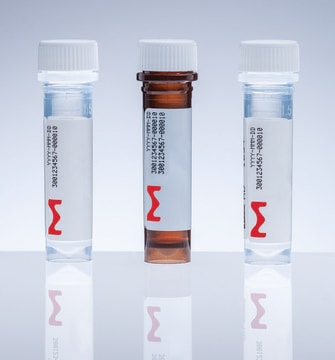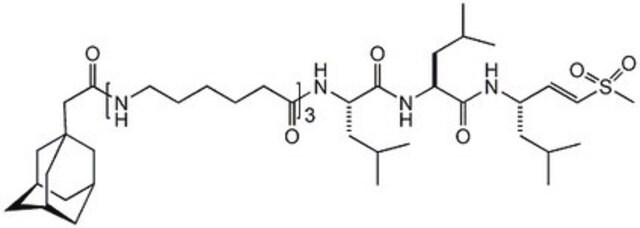17-608
ChIPAb+ HDAC1 - ChIP Validated Antibody and Primer Set
culture supernatant, from mouse
Sign Into View Organizational & Contract Pricing
All Photos(2)
About This Item
UNSPSC Code:
12352203
eCl@ss:
32160702
NACRES:
NA.52
Recommended Products
Related Categories
General description
All ChIPAb+ antibodies are individually validated for chromatin precipitation, every lot, every time. Each ChIPAb+ antibody set includes control primers (tested every lot by qPCR) to biologically validate your IP results in a locus-specific context. The qPCR protocol and primer sequences are provided, allowing researchers to validate ChIP protocols when using our antibody in their chromatin context. Each set also includes a negative control antibody to ensure specificity of the ChIP reaction.
The ChIPAb+ HDAC1 set includes the HDAC1 antibody, the negative control antibody supernatant (mouse IgG), and qPCR primers flanking an Sp1 binding site in human p21 (WAF1/CIP1/CDKN1A) promoter, amplifying a 105 base pair PCR product. The HDAC1 and negative control antibodies are supplied in a scalable "per ChIP" reaction size and can be used to functionally validate the precipitation of HDAC1 associated chromatin.
The ChIPAb+ HDAC1 set includes the HDAC1 antibody, the negative control antibody supernatant (mouse IgG), and qPCR primers flanking an Sp1 binding site in human p21 (WAF1/CIP1/CDKN1A) promoter, amplifying a 105 base pair PCR product. The HDAC1 and negative control antibodies are supplied in a scalable "per ChIP" reaction size and can be used to functionally validate the precipitation of HDAC1 associated chromatin.
Specificity
HDAC1
Immunogen
The HDAC1 antibody is made against a peptide corresponding to amino acids 467-482 of mouse HDAC1.
Application
Chromatin Immunoprecipitation Analysis:
Sonicated chromatin prepared from untreated or actinomycin D treated (30 ng/mL, 6 hrs.) U2OS cells (3 X 106 cell equivalents per IP) was subjected to chromatin immunoprecipitation using 4 μL of Mouse Anti-HDAC1 and the Magna ChIP® G (Cat. # 17-611) Kit. Immunoprecipitation of HDAC1 associated DNA fragments was verified by qPCR using ChIP Primers p21 flanking the human p21 promoter that contains an Sp1 binding site (Please see figures).
Fold Decrease is a ratio of normalized mean IP quantities extracted from standard curves derived from inputs of each chromatin sample. As previously published, HDAC1 association with this region of the p21 promoter decreases upon actinomycin D treatment.
Western Blot Analysis:
3T3/A31 cell lysate was resolved by electrophoresis, transferred to nitrocellulose and probed with anti-HDAC1 (1:2500). Proteins were visualized using a goat anti-mouse secondary antibody conjugated to HRP and a chemiluminescence detection system (Please see figures).
Sonicated chromatin prepared from untreated or actinomycin D treated (30 ng/mL, 6 hrs.) U2OS cells (3 X 106 cell equivalents per IP) was subjected to chromatin immunoprecipitation using 4 μL of Mouse Anti-HDAC1 and the Magna ChIP® G (Cat. # 17-611) Kit. Immunoprecipitation of HDAC1 associated DNA fragments was verified by qPCR using ChIP Primers p21 flanking the human p21 promoter that contains an Sp1 binding site (Please see figures).
Fold Decrease is a ratio of normalized mean IP quantities extracted from standard curves derived from inputs of each chromatin sample. As previously published, HDAC1 association with this region of the p21 promoter decreases upon actinomycin D treatment.
Western Blot Analysis:
3T3/A31 cell lysate was resolved by electrophoresis, transferred to nitrocellulose and probed with anti-HDAC1 (1:2500). Proteins were visualized using a goat anti-mouse secondary antibody conjugated to HRP and a chemiluminescence detection system (Please see figures).
Research Category
Epigenetics & Nuclear Function
Epigenetics & Nuclear Function
Research Sub Category
Chromatin Biology
Chromatin Biology
This ChIPAb+ HDAC1 -ChIP Validated Antibody & Primer Set conveniently includes the antibody & the specific control PCR primers.
Packaging
10 assays per kit, ~4μL per chromatin immunoprecipitation
Quality
Routinely evaluated by chromatin immunoprecipitation on U2OS cells and immunoblot on 3T3/A31 nuclear lysate.
Target description
60 kDa
Physical form
Anti-HDAC1 (mouse monoclonal IgG1,supernatant). One vial containing 40 μL of culture supernatant with 0.05% sodium azide. Store at -20°C.
Negative ChIP Control Supernatant. One vial containing 40 uL of mouse IgG containing supernatant with 0.05% sodium azide. Store at -20°C.
ChIP Primers p21. One vial containing 75 μL of 5 μM of each primer specific for a region of the human p21 (WAF1/CIP1/CDKN1A) promoter. Store at -20°C.
P21 Forward: CCC ACA GCA GAG GAG AAA GAA
P21 Reverse: CTG GAA ATC TCT GCC CAG ACA
Negative ChIP Control Supernatant. One vial containing 40 uL of mouse IgG containing supernatant with 0.05% sodium azide. Store at -20°C.
ChIP Primers p21. One vial containing 75 μL of 5 μM of each primer specific for a region of the human p21 (WAF1/CIP1/CDKN1A) promoter. Store at -20°C.
P21 Forward: CCC ACA GCA GAG GAG AAA GAA
P21 Reverse: CTG GAA ATC TCT GCC CAG ACA
Storage and Stability
Stable for 1 year at -20°C from date of receipt
Analysis Note
Control
Included negative control antibody supernatant mouse IgG and control primers specific for human p21 (WAF1/CIP1/CDKN1A) promoter.
Included negative control antibody supernatant mouse IgG and control primers specific for human p21 (WAF1/CIP1/CDKN1A) promoter.
Legal Information
MAGNA CHIP is a registered trademark of Merck KGaA, Darmstadt, Germany
UPSTATE is a registered trademark of Merck KGaA, Darmstadt, Germany
Disclaimer
Unless otherwise stated in our catalog or other company documentation accompanying the product(s), our products are intended for research use only and are not to be used for any other purpose, which includes but is not limited to, unauthorized commercial uses, in vitro diagnostic uses, ex vivo or in vivo therapeutic uses or any type of consumption or application to humans or animals.
Storage Class
10 - Combustible liquids
Certificates of Analysis (COA)
Search for Certificates of Analysis (COA) by entering the products Lot/Batch Number. Lot and Batch Numbers can be found on a product’s label following the words ‘Lot’ or ‘Batch’.
Already Own This Product?
Find documentation for the products that you have recently purchased in the Document Library.
Qing Xie et al.
International journal of cancer, 135(3), 635-646 (2014-01-01)
Secreted frizzled-related proteins (SFRPs) are antagonists of the Wnt signaling pathway whose epigenetic downregulation have been shown to be involved in hepatocarcinogenesis. However, dysregulation of SFRPs induced by hepatitis B virus (HBV) X protein (HBx) has never been studied in
Christian M Hedrich et al.
The Journal of biological chemistry, 286(50), 43429-43436 (2011-10-07)
IL-2 is a key cytokine during proliferation and activation of T lymphocytes and functions as an auto- and paracrine growth factor. Regardless of activating effects on T lymphocytes, the absence of IL-2 has been linked to the development of autoimmune
Q Cao et al.
Oncogene, 27(58), 7274-7284 (2008-09-23)
Enhancer of zeste homolog 2 (EZH2) is a critical component of the polycomb-repressive complex 2 (PRC2), which is involved in gene silencing and histone H3 lysine 27 methylation. EZH2 has a master regulatory function in controlling such processes as stem
Thomas Rauen et al.
The Journal of biological chemistry, 286(50), 43437-43446 (2011-10-26)
IL-17A is a proinflammatory cytokine that is produced by specialized T helper cells and contributes to the development of several autoimmune diseases such as systemic lupus erythematosus (SLE). Transcription factor cAMP-responsive element modulator (CREM)α displays increased expression levels in T
Claudio Cantu' et al.
Nucleic acids research, 39(2), 486-501 (2010-09-21)
The Sox6 transcription factor plays critical roles in various cell types, including erythroid cells. Sox6-deficient mice are anemic due to impaired red cell maturation and show inappropriate globin gene expression in definitive erythrocytes. To identify new Sox6 target genes in
Our team of scientists has experience in all areas of research including Life Science, Material Science, Chemical Synthesis, Chromatography, Analytical and many others.
Contact Technical Service







